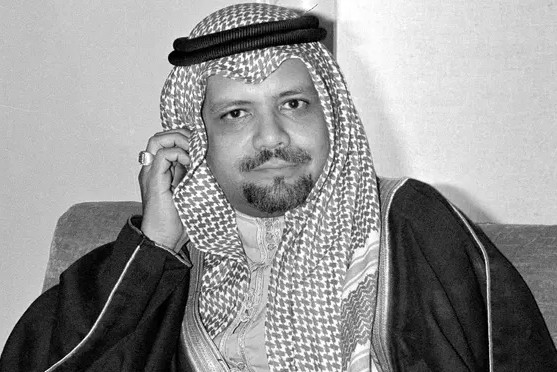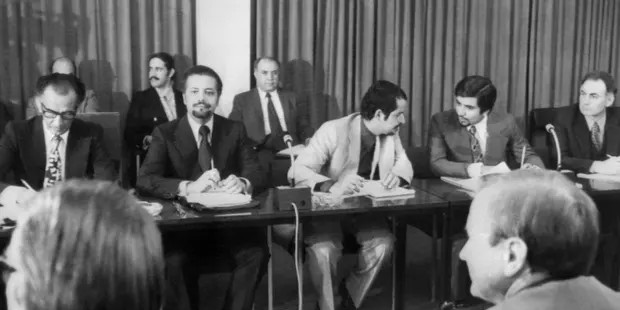
Date: 2026-01-21 Page is: DBtxt003.php txt00022311
POWERFUL PEOPLE
SHEIKH ZAKI YAMANI
Sheikh Ahmed Zaki Yamani obituary ... Powerful Saudi Arabian oil minister who played a key role in the global crisis of the 1970s and was kidnapped by Carlos the Jackal
SHEIKH ZAKI YAMANI
Sheikh Ahmed Zaki Yamani obituary ... Powerful Saudi Arabian oil minister who played a key role in the global crisis of the 1970s and was kidnapped by Carlos the Jackal

Ahmed Zaki Yamani at a news conference in Doha, Qatar, in 1976. Photograph: AP
Original article: https://www.theguardian.com/world/2021/mar/01/sheikh-ahmed-zaki-yamani-obituary
Burgess COMMENTARY
Sheikh Zaki Yamani was one of the most influential people in the world during the 1970s. What he accomplished as the Oil Minister for Saudi Arabia was monumental and set the stage for a complete reordering of global power relationships.
Many of the thought leaders of today (2022) are too young to appreciate the role Yamani played in determining almost everything in society, the economy and the international balance of power from the 1970s till now.
Peter Burgess
Written by Ian Black @ian_black
Monday 1st March 2021 10.42 EST (Accessed April 2022)
In the 1970s and 80s Ahmed Zaki Yamani, who has died in London aged 90, was a symbol of the new age of oil, wealth and power that “black gold” accorded to his homeland Saudi Arabia – still the possessor of the world’s largest oil reserves.
Known internationally for his suave style, goatee beard and soft-spoken tone, Yamani served as petroleum and mineral resource minister under four Saudi monarchs, starting in 1962 with Saud, son of the founder of the conservative kingdom. He was also a highly influential figure in the Organisation of Petroleum Exporting Countries (Opec), founded in 1960. For most of that decade oil was less than $2 per barrel.
Yamani first captured world attention during the crisis that erupted in October 1973 when Egypt and Syria launched their war on Israel, following its victory in 1967. King Faisal, initially reluctant, in solidarity with other Arab oil exporters and Iran, initiated production cuts and halted supplies to the US and other western countries. The Arab embargo was the response to Washington’s unwavering support for the Jewish state.
Oil prices then quadrupled globally, triggering an international crisis and generating vast wealth for producers. “We are masters of our own commodity,” Yamani declared. Until 1973 the Saudis had earned $8-9bn a year. By spring 1974 their annual revenues were $34bn, though Faisal’s role in the embargo had ended by then. Rising consumption contributed to increased profits. The jokey pun “Yamani or your life” reflected his global fame.
Yamani later extricated the Saudi oil industry from the grip of American companies in a series of moves that produced a deal on national ownership of Saudi Aramco in 1976, marking the emergence of the kingdom as the leading power in the region and an improved relationship with successive US administrations.

Ahmed Zaki Yamani, second left, attending the negotiations between the Organisation of Petroleum Exporting Countries (Opec) and the representatives of the western oil companies in 1973. Photograph: AFP/Getty Images
Yamani’s close links with Faisal ensured him a key role in these historic developments, and he was rewarded by large tracts of land, which made him very rich. “His style of diplomacy, his mastery of analysis and negotiation, and his skill with the press all gave him a decisive influence,” wrote Daniel Yergin in his history of the oil industry, The Prize. “His power [was] augmented by simple longevity, the fact that he ended up being ‘there’ longer than anyone else.” But he got on badly with Henry Kissinger, President Richard Nixon’s national security adviser, who preferred cooperating with the Shah of Iran.
Proximity to the throne meant Yamani personally witnessed dramatic events. In March 1975, he saw Faisal being assassinated by his nephew. In December that year he was among the 11 Opec ministers taken hostage in Vienna, by Ilich Ramirez Sanchez, the Venezuelan terrorist known as Carlos the Jackal. “Carlos and me, we were talking, joking and so on,” Yamani later told Al Jazeera TV. “I mean, he was very kind to me, but he told me he was going to kill me.” Yamani and Jamshid Amouzegar, his Iranian counterpart, were the last to be released in Algeria, to where they had been flown.
Yamani was born in Mecca, the birthplace of the Prophet Muhammad, when camels still thronged the streets. His father Hassan and grandfather were Islamic jurists of Yemeni origin, and his mother, Fatima, was a poet. He was quickly recognised as intelligent and studied at universities in Cairo and New York, and took an MA in international law at Harvard, where he gained useful insights into American life.
In the late 50s he set up the first law office in Saudi Arabia and worked as an adviser to government ministers, attracting the attention of Faisal, who succeeded Saud in 1964. The following year he drafted the kingdom’s anti-slavery law. Yamani was one of few commoners working for the royal family. His title “sheikh” was entirely honorific – a reflection, Yergin argued, of exaggerated perceptions of his influence.
In 1986 he was sacked after disputes with King Fahd, who came to the throne after the death of his brother Khaled in 1982. By then crude prices had dropped to record lows. He had held his position for 24 years, making him the longest-serving oil minister in Opec. In 1990, Yamani launched the Centre for Global Energy Studies in London but lived in Switzerland. He also set up a foundation for the preservation and publication of old Arabic and Islamic manuscripts.
In an interview in 2000, when shale oil was little known and renewables were still in their infancy, Yamani predicted that technology such as electric cars, combined with environmental legislation, would reduce the consumption of fossil fuels and increase production from outside Opec. “The stone age did not end because the world ran out of stone, and the oil age will end long before the world runs out of oil,” he famously said.
Two decades earlier his birthplace was clearly on his mind when he told the journalist Robert Lacey: “If I have to say one thing that this kingdom stands for, above all others, it is Islam. One day even we will run out of oil. But we will never run out of Mecca and Medina.”
He and his first wife, Laila Sulaiman Faidhi, an Iraqi, married in 1955 and had two daughters, Mai (a UK-based author and scholar) and Maha, and a son, Hani. Tamam al-Anbar became his second wife in 1975 and they had two daughters, Sarah and Arwa, and three sons, Faisal, Sharaf and Ahmed. Yamani is survived by Tamam, his children, 24 grandchildren and one great-grandchild.
Ahmed Zaki Yamani, diplomat, born 30 June 1930; died 23 February 2021